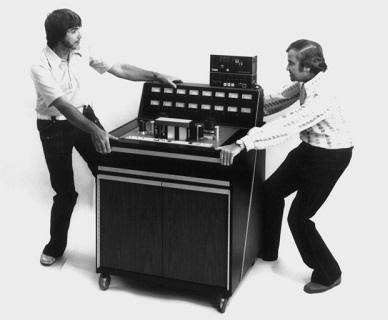Recording Engineers, Producers and Associated Recording Industry Professionals
Message Board - Industry Professionals General Discussion

The music industry is a complex system of many different organizations, firms and individuals and has undergone dramatic changes in the 21st century.
However, the majority of the participants in the music industry still fulfill their traditional roles, which are described below.
There are three types of property that are created and sold by the recording industry: compositions, recordings and media (such as CDs or MP3s). There may be many recordings of a single composition and a single recording will typically be distributed into many media.
|
Recordings
Recordings are created by recording artists, often with the assistance of record producers and audio engineers. They were traditionally made in recording studios (who are paid a daily or hourly rate) in a recording session. In the 21st century, advances in recording technology have allowed many producers and artists to create "home studios", bypassing the traditional role of the recording studio. The record producer oversees all aspects of the recording, making many of the logistic, financial and artistic decisions in cooperation with the artist. Audio engineers (including recording, mixing and mastering engineers) are responsible for the audio quality of the recording. A recording session may also require the services of an arranger or studio musicians. Recordings are (traditionally) owned by record companies. A recording contract specifies the business relationship between a recording artist and the record company. In a traditional contract, the company provides an advance to the artist who agrees to record music that will be owned by the company. The A&R department of a record company is responsible for finding new talent and overseeing the recording process. The company pays for the recording costs and the cost of promoting and marketing the record. For physical media (such as CDs), the company also pays to manufacture and distribute the physical recordings. Smaller record companies (known as "indies") will form business relationships with other companies to handle many of these tasks. If contractually bound to do so, the record company pays the recording artist a portion of the income from the sale of the recordings, generally known as a mechanical royalty. (This is distinct from the publishing royalty, described above.) This portion is similar to a percentage, but may be limited or expanded by a number of factors (such as free goods, recoupable expenses, bonuses, etc.) that are specified by the record contract. Session musicians and orchestra members (as well as a few recording artists in special markets) are under contract to provide work for hire; they're typically only paid one-time fees or regular wages for their services, rather than royalties. Foundational text courtesy of Wikipedia. |
Loading
Recording Engineers, Producers and Associated Recording Industry Professionals
Do you have content, to add, about Recording Engineers, Producers and Associated Recording Industry Professionals or associated topics? Please feel free to Share it, here!
What other Visitors have said about Recording Engineers, Producers and Associated Recording Industry Professionals
Click below to see contributions from other visitors to this page...
George Raymond Recording Studio/ Live engineer 




During the 60's George recorded many of Jamaica's Ska groups including the Skatalites with Don Drommond on trombone., recordings at this time were limited …
Ralph Moss 




Credits:
The Box Set Series
Gladys Knight & the Pips
Producer
2013
Give Me Strength: The '74/'75 Studio Recordings
Eric Clapton
Engineer
2013 …
My Family 




I'm proud of my music industry connections, since I was born into them.
My grandmother, Ernestine Atwell May, was a jazz pianist and songwriter; …
Vernon Fox 




Vernon Fox
Columbia Records Engineer
Arthur Kendy
Norma Beecroft 




Norma Beecroft is part of a generation of pioneering professional composers that firmly established Canada's place on the world's musical map. An award-winning …
Édouard-Léon Scott 




Édouard-Léon Scott de Martinville (1817-1879) is credited with the invention of the phonautograph. The phonautograph is the first instrument containing …
George Martin 




Sir George Henry Martin CBE (born 3 January 1926) is an English record producer, arranger, composer, conductor, audio engineer and musician. He is sometimes …
Gary Vandy 




I opened a Studio, in the Grove, in 1970 while at the University of Miami. Also had Location Sound Recordings Inc. at the same time. In 1972 I opened Studio …
Charles Ginsburg 


Charles Ginsburg (1920-1992) was an engineer and the leader of a research team at Ampex which developed one of the first practical videotape recorders. …
Fritz Pfleumer 


Fritz Pfleumer (20 March 1881 in Salzburg – 29 August 1945 in Radebeul) was a German-Austrian engineer who invented magnetic tape for recording sound. …
Janet A Brooks Not rated yet
Recording engineer in the 70's. Did a lot of night sessions in a large studio in Melbourne - before an audio accident left me with no highs in my left …
Fred Weinberg Not rated yet
A few photos of Engineer- producer Fred Weinberg with Tony (I like it like that) Pabon, and others including Joe Beck, Sinatra -Tito Puente, A&R recording, …
Gary S. Paxton Not rated yet
Gary S. Paxton started trying to write at the age of 10. He has written or co-written over 2000 songs. He has been very blessed. Approximately 600 of them …
Greg Pine, Chief Engineer, Pacific Recording Studio (Early 1970's) Not rated yet
Fred was my mentor in the recording business. I learned more about the business and techniques from Fred, than any other person in the industry. Fred …
Vladimir K. Zworykin Not rated yet
Vladimir Kosmich Zworykin (July 29, 1888 – July 29, 1982) was a Russian-merican inventor, engineer, and pioneer of television technology. Zworykin invented …
Marvin Camras Not rated yet
Marvin Camras (1916–1995) was an electrical engineer and inventor who was widely influential in the field of magnetic recording.
Camras built his first …
Norma Beecroft, continued... Not rated yet
Pictures courtesy of Norma Beecroft.
Return to Homepage |


